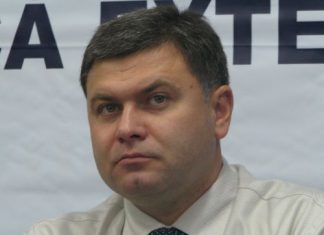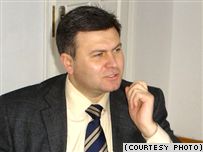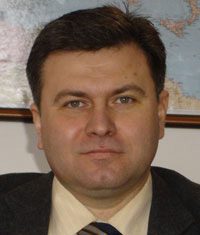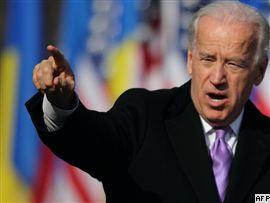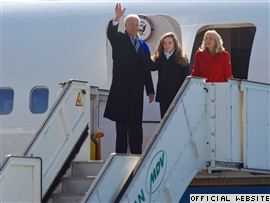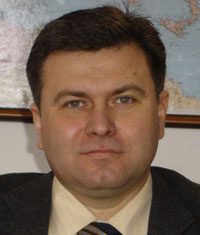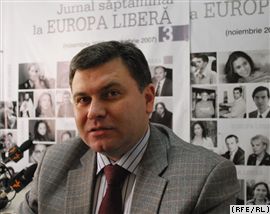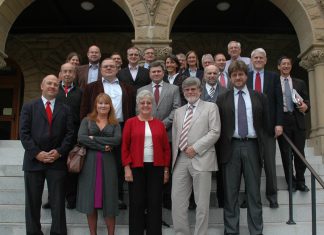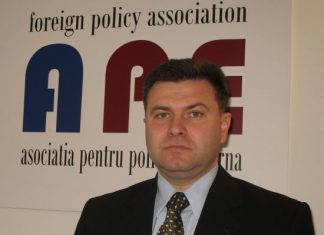„Ravnopravie Storon” means the clinical death of the Republic of Moldova. Info-Prim Neo. 16.06.2011.
On June 10, the Russian ambassador Valeri Kuzmin tried once again the limits of the Chisinau authoritys pragmatic patience. Taking advantage of the reception organized with the occasion of Russias national day, he gave the word to the Transnistrian region representative Vladimir Yastrebchak, presenting him no more, no less, as foreign minister of Transnistria”. To his surprise, but also to ours, the proverbial patience of the Moldovan diplomats has broken”, as they left the reception as a sign of protest. No less surprising was the gesture of American and European diplomats present at the event, that followed the act of dignity and courage of our diplomats.
Victor Chirilă: Achiles heel of the EU in Moldova. Info-Prim Neo. 24.05.2011.
On June 5, 2010, German Chancellor Angela Merkel and Russias President Dmitry Medvedev signed the Russian-German Memorandum of Meseberg, under which the EU and Russia are to create a joint Foreign Policy and Security Committee at the level of ministers, with the Transnistrian conflict to become a major subject in the Councils agenda. It will be soon a year of this date, but the committee has not been yet set up. Moscow considers that the ball is in the court of Brussels, which should respond to the proposals submitted by it last summer, concerning the work of the committee proposed by Merkel and Medvedev in Meseberg.
Victor Chirilă: Resumption of official talks in 5+2 format is necessary, but at what...
A new round of informal talks on the settlement of the Transnistrian conflict in the 5+2 format (Moldova and Transnistria as conflicting sides, the OSCE, Russia and Ukraine as mediators, and the U.S. and the EU as observers) took place in Vienna on April 4-5. Despite the expectations, the parties dd not manage to reach a compromise as regards the resumption of the official talks in the 5+2 format.
Biden Backs Moldovan Reforms, Territorial Integrity. Radio Free Europe. 11.03.2011.
U.S. Vice President Joe Biden was in Moldova today for a brief visit to encourage reform in the impoverished nation and push for a peaceful settlement of its separatist conflict.Biden, the highest-ranking U.S. official to visit Moldova since the country declared independence from Soviet rule,
U.S. Vice President Kicks Off Finland, Russia, And ‘Model’ Moldova Visits. Radio Free Europe....
U.S. Vice President Joe Biden shares a laugh with Finnish President Tarja Halonen at the Presidential Palace in Helsinki.
Victor Chirilă: PLDM, PD and PL in search of lost time. Info-Prim Neo. 07.12.2010.
The November 28 elections were expected to produce the long-sought clarity on the Moldovan political arena, but unfortunately for us, it wasn't meant to be this time either. Things start to look even more mixed up, the political crisis is continuing, and the country's future seems to be more uncertain than ever. To rephrase an old Moldovan proverb, a poor man can never get his politicians carry the load”. At this moment, this saying describes our realities best.
Progress made during 2010 in the transnistrian settlement. APE. 11.11.2010.
Regular meetings between political representatives of Chisinau and Tiraspol - Deputy Prime Minister for Reintegration Victor Osipov and Vladimir Yastrebchak. It is relevant that one of the meetings took place right in Tiraspol, on the occasion of launching the working groups. These constant meetings have contributed to solving the current problems and to strengthening the confidence-building measures between the two sides of the Nistru.
OSCE Summit in Astana – an important opportunity to resume negotiations in the “5+2”...
During this year, there were a series of events, both domestically and internationally, which resulted in the resumption of the permanent "5+2" dialogue as well as the fulfillment of certain concrete promises, such as for example, to resume passenger transportation on the Tiraspol-Chisinau-Odessa railroad. But there were some incidents caused by the transnistrian side, which disrupted the consultation process by creating artificial tensions. However, uncontrolled escalation of the conflict situations was successfully avoided. This is due, in large part, to the balanced and constructive attitude demonstrated by the Chisinau authorities this year.
KIEV IN FALL. Novaya Online Gazeta Transnistria. APE, Transnistrian Dialogues. 20.10.2010
In the morning on the 15th of October we went to the Ukrainian Foreign Ministry, where an old acquaintance was already expecting us - a former employee of the Embassy of Ukraine in the Republic of Moldova, Marco Shevchenko. Now, his place of work is the Political and Security Department of the Ministry of Foreign Affairs.
Victor Chirila: Moldovan-Russian pragmatism sank in Moldovan wine at Solntzevo. Timpul. 22.07.2010.
(This commentary was published in Moldovan newspaper TIMPUL on July 22, 2010)
STEFAN FUELE AND PHILIPPE LE HOUEROU: Rethink Moldova. EUObserver.com. 23.04.2010.
With an average yearly income of only €1,100, Moldovans have seen their country steadily grow in the past decade only to run into the headwinds of the global economic crisis.
The EU’s Conditionality in the Case of Moldova: Failure or Success?. Leonid Litra. Institut...
Draft Paper - Please do not quote.
This paper was prepared within the Study Programme on European Security implemented by Institut fur Europaische Politik.
The final paper will be published on www.iep-berlin.de
Presentation by Victor Chirila, Executive Director APE:Moldova: East or WestBetween Moscow and Brussels”. Stanford...
[pdf-embedder url="http://www.ape.md/wp-content/uploads/public/publications/883152_en_moldova___betwe.zip
Irina Severin: Moving Beyond Russia’s Embrace. Radio Free Europe. 29.10.2009
Russia enjoys dabbling in the domestic politics of its neighboring countries, publicly supporting its favorite politicians and demonstrating its contempt for those whom it dislikes. But it rarely -- at least among its European neighbors -- gets the result it is seeking. The most recent example is Moldova.
Biden Urges Central Europe To Help Guide Fledgling Democracies. Radio Free Europe. 22.10.2009.
U.S. Vice President Joe Biden speaks at the Central University Library in Bucharest.
Molotov-Ribbentrop Pact Still Divides Europe. Radio Free Europe. 17.10.2009.
Called "Europe 70 years after the Molotov-Ribbentrop Pact," and sponsored by the Baltic states Lithuania, Latvia and Estonia, the conference was organized to discuss the fates of those countries -- together with Poland, Romania and Finland -- that were stripped of their national statehood and relegated to the status of pawns in the designs of Europe's two great powers in 1939.
Analysis by Victor Chirila, Foreign Policy Association acting executive director: CIS Summit behind, AEI...
The Summit of the Commonwealth of Independent States (CIS) took place in Chisinau on October 9. This event, in the view of the former government, was to crown the victory of the Communists Party (PCRM) in this years parliamentary elections. Moreover, if the PCRM remained in power, the CIS Summit was to sanction the reorientation to the East of Moldovas foreign policy. The PCRMs defeat in the early legislative elections of July 29 and the coming to power of the Alliance for European Integration (AEI) thwarted the plans of the former head of state Vladimir Voronin and his party.


